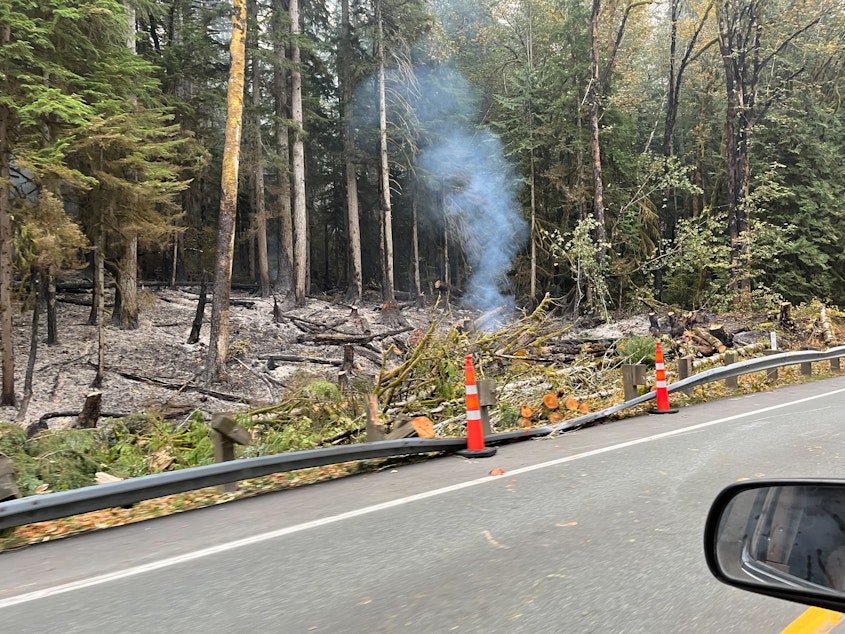Burning through containment confusion: Today So Far

- Bolt Creek fire is 28% contained. What does "contained" mean?
- There will soon be a hate crime hotline in King County.
- Viet-Wah Supermarket closes for good today, after 40 years of service in Seattle.
This post originally appeared in KUOW's Today So Far newsletter for September 30, 2022.
The Bolt Creek fire was 97% contained about a week ago. Then it was 13% contained. Now it's about 28% contained. What is going on? According to officials on the ground, there was some confusion between management teams, which led to the range of numbers. There has also been some confusion among KUOW's audience about what exactly "contained" means when reporting about wildfires.
Think of it this way, when my pot contains water, the water is inside the pot. Saying it is "contained" doesn't mean the water is no longer there, or has boiled away. When a wildfire is contained, it basically means that crews have dug fire lines and are using rivers or other natural barriers to stop the spread of the fire in an area — the fire is contained within those borders, but the fire is still there. Just as the Bolt Creek fire is still burning today. "Contained" doesn't mean "put out," as in a fire has been X% extinguished.
All that rain La Niña is supposed to bring this October can't come soon enough. It's rain that can hopefully knock our wildfires down. Read more here.
There will soon be a hate crime hotline in King County. The County Council approved a plan to develop the hotline and a web portal this week. A workgroup is tasked with developing how to implement it and will present its plan to the Council by May 2023. The move comes after a recorded rise in such incidents, locally.
King County's Coalition Against Hate and Bias has recorded 560 reports of hate crimes since mid-2020. Reported hate crimes in King County peaked at 157% in February 2021, according to the County's Prosecutor's Office. Read more here.
Sponsored
It's the end of an era. The Viet-Wah Supermarket will close for good today, when the final shift is over at 7 p.m. If you want to make one last visit to the store in Seattle's Little Saigon, today is the day.
Viet-Wah has been a go-to source for Pan-Asian products for nearly 40 years. Generations have grown up going there, such as Leeching Tran, daughter of Duc Tran, who founded the store. She is vice president of Viet-Wah today, and has come to know the regulars throughout her life there.
"You know, it's familiar faces, people you know, and recognize and you look forward to seeing every time you come here, so that's gonna be hard I think," Tran told KUOW.
Viet-Wah's owners say that business went considerably downhill during the pandemic, and amid a recent rise in hate crimes targeting Asians. Now, the land where the market is located is slated for new development — housing, retail, and parking.
My family usually goes to the Viet-Wah location in Renton. That location will remain open. Read more here.
Sponsored
AS SEEN ON KUOW

Ari Spandl is a Senior Community Manager with tinyBuild, which has adapted to a remote working style. tinyBuild reduced dependence on its Bellevue office, and started hiring more people in other places. Now it has a main office in the Netherlands, along with a development studio in Latvia. Spandl said in their meetings, participants see people from across the country and around the world. (Joshua McNichols / KUOW)
DID YOU KNOW?
Yesterday was National Coffee Day. Get ready for an even bigger celebration — International Coffee Day on October 1. I've been sending you coffee factoids this week, such as this on: Coffee of various forms may contribute to longer life (basically, a study of coffee drinkers in the UK found that whether it was decaf, ground, or instant coffee, 2-3 cups a day were associated with reductions in cardiovascular disease).
Sponsored
One of my favorite historic tales of coffee is of its salvation. This particular story may be partly true, and partly a fun legend to tell. Coffee spread across the globe for hundreds of years, but when it really started to take hold in parts of Europe, there was some pushback. Some folks called it "Satan's drink." This attitude could have been influenced by the fact that people seemed to be possessed by a mysterious energy after drinking it. And it could have been influenced by the fact the coffee was coming from non-Christian corners of the globe, like Muslims in the Middle East. This all posed a problem for Pope Clement VIII, who really liked to drink coffee. How could a pope be so fond of Satanic imbibing?! The solution was simple. The pope baptized coffee (or he simply blessed it, depending on the story). After that, coffee was cool. At least, it was for a while with Catholics.
Coffee has also faced opposition in other eras and places. England banned women from coffeehouses in the 1600s. Coffee was banned five times in the 1700s and 1800s in Sweden (ironic, because Sweden is among the top coffee consuming countries today). Drinking coffee was punishable by death under the rule of Sultan Murad IV, who ruled the Ottoman Empire in the 1600s. Some historic accounts say that the sultan would walk the streets of Istanbul, disguised as a commoner. When he found someone drinking coffee, he would produce a sword and deliver punishment himself.
ALSO ON OUR MINDS

Sponsored
Russian President Vladimir Putin has moved to formally annex four Ukrainian territories, signing what he calls "accession treaties" that world powers refuse to recognize. It's Putin's latest attempt to redraw the map of Europe at Ukraine's expense.

